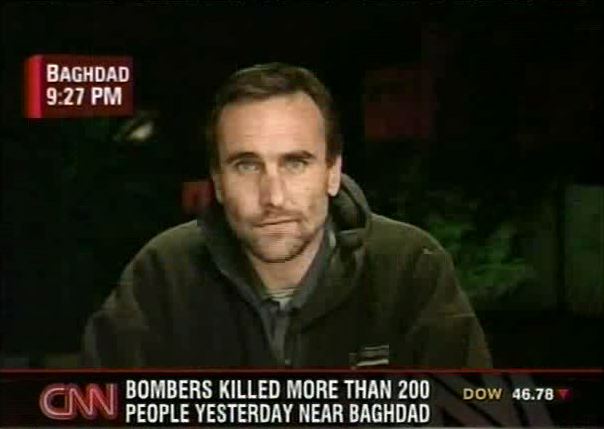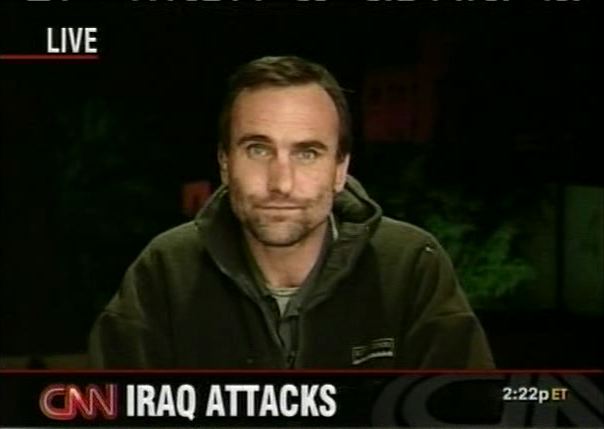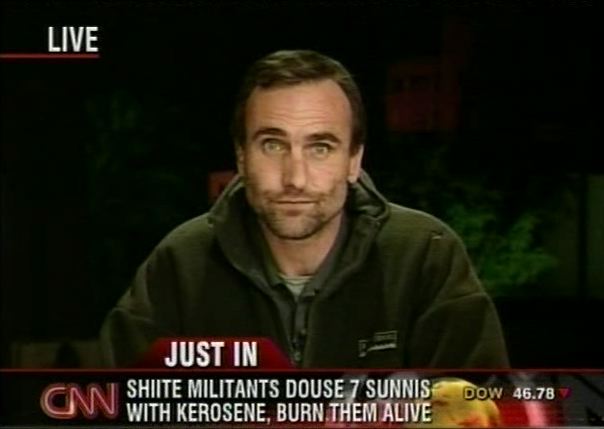NR: "Imagine Manhattan with two different districts shelling and bombing each other"

Click photo to play
Length: 3:32
T.J. HOLMES: The Shiites' revenge. A day after the single bloodiest attack of the Iraq war, more than 200 Shiites slaughtered in Baghdad, Shiite death squads are attacking Sunni mosques, Sunni worshippers and laying waste to Sunni neighborhoods.
We'll bring in now CNN's Michael Ware, who's in the Iraqi capital -- Michael.
MICHAEL WARE, CNN CORRESPONDENT: Yes, T.J. In the wake of what's effectively been a Thanksgiving Day massacre, this multiple car bomb strike on an overcrowded densely populated Shia ghetto known as Sadr City here in Baghdad, we've seen the blowback begin.
Immediately after yesterday's attack there was mortar strikes on surrounding Sunni neighborhoods. Well, today we now have reports that as many as four, perhaps as many as six Sunni mosques have been attacked. We've heard that two have been burned; two others hit by RPGs.
Now, there's wild and conflicting reports emerging from Sunni neighborhoods or neighborhoods that are predominantly Shia but have pockets of Sunni communities within them, of people being driven from their homes by hand grenade explosions and rocket propelled grenades. There's even terrible reports, completely unconfirmed, of people being pulled from their houses and doused in flammable material and set alight. Either way, what we're seeing is definitely the hints of retaliation by a beleaguered Shia population.
All of this despite a crackdown, a heavy curfew on the capital here that's still in effect as I speak.
HOLMES: And Michael, you said a crackdown and curfew. Are those the two things that right now -- the only two things, I guess -- now being put in place to kind of stop this violence? It seems like it's just getting going. But is this the only two methods, I guess, in place right now to try to quell some of this violence right now?
WARE: Well, yes, this is all part of one broader continuum the U.S. military steadfastly refuses to call civil war. But what we've seen is strike upon strike upon strike, the Shia upon the Sunni and the Sunni upon Shia.
While the Sunni extremists of al Qaeda and other Islamic groups use suicide bombings for mass impact, what the Shia have proven so adept at is death squads in government and police uniforms, hauling Sunnis from their home, from their cars, at random or targeted and executing them, if not torturing them beforehand.
So all of this is part of a much, much bigger picture.
And yes, last night there was an emergency meeting of the national crisis committee involving the U.S. ambassador, the American general in command of forces here on the ground, the Iraqi prime minister, the national security adviser, the minister of defense and the minister of interior.
Their primary objective last night was to prevent retaliation. That's why they had the curfew. That's why they've reached out to leaders on both sides of the sectarian divide, urging them to call for calm, which by and large, we have been seeing.
Nonetheless, there's a degree to which once this violent sectarian genie has been let out of the bottle, there's no way of putting it back in, curfews or not.
HOLMES: All right. Our Michael Ware for us in Baghdad. Michael, thank you so much.

Click photo to play
Length: 2:16
KYRA PHILLIPS: One day after the slaughter in Sadr City, Shiite militias are out for blood across Baghdad. Their target, Sunni mosques, Sunni neighborhoods, Sunnis in general. And their methods are brutal.
Straight to the Iraqi capital and CNN's Michael Ware -- Michael.
MICHAEL WARE, CNN CORRESPONDENT: Yes, Kyra, what we're seeing is vicious blowback from the terrible Thanksgiving Day massacre that we saw yesterday in which at least 200 Shia lost their lives -- men, women and children, in the crowded Shia ghetto known as Sadr City. In the period of half an hour, as many as six car bombs were detonated.
At the same time, the Ministry of Health, controlled by the same Shia faction, was attacked. What we've seen since then, in the immediate aftermath yesterday on Thanksgiving, we saw mortars lobbing on surrounding Sunni neighborhoods. Today we've seen that intensify.
In predominantly Shia neighborhoods with small Sunni communities, we've seen gunmen turn on those isolated communities. Four Sunni mosques have been attacked, perhaps as many as six. Two burned, two hit by rocket-propelled grenades.
We're hearing unconfirmed and wild horror stories from Sunni witnesses about people being driven from their homes by hand grenades. Even claims that people have been taken from their houses, covered with flammable liquid and set alight.
It's an absolutely appalling situation here. And all of this during a lockdown, during a curfew designed specifically to prevent it.
Nonetheless, as I'm speaking to you now, I can hear the sounds of a battle or some kind of gunfight taking place just a suburb or two away from me. So what we're now seeing, imagine Manhattan with two different districts shelling and bombing each other. This is what Baghdad is like, with American fighter jets sounding overhead, and the U.S. military, frankly, appearing impotent, unable to stop it.
PHILLIPS: Michael Ware, live from Baghdad.
Wow.

Click photo to play
Length: 2:24
KYRA PHILLIPS: Now to Iraq, and confirmation of a ghastly development -- we have been reporting witness accounts that Sunni worshipers were attacked today in Baghdad by Shiite militiamen and burned alive.
CNN is now able to confirm this appalling story on a day of violence that was, by any standard, just spinning out of control.
Let's get straight to Baghdad and CNN's Michael Ware -- Michael.
MICHAEL WARE, CNN CORRESPONDENT: Yes, Kyra, we're really starting to get the full brunt of the Shia backlash, following yesterday's Thanksgiving Day car bombing massacre, in which at least 200 men, women, and children were killed, hundreds more wounded.
In the immediate aftermath, we saw mortars raining from Sadr City into surrounding Sunni neighborhoods -- today, even more horrific tales emerging from Shia-dominated neighborhoods that have small Sunni communities within them.
What we're hearing from these areas is just terrifying, that four mosques, for example, in one district alone have been attacked, two burned, two others hit with rocket-propelled grenades. We also have reports of Sunni mosques elsewhere in the city being hit.
We're hearing that Shia militiamen are preventing locals from fighting the fires at these mosques. We're hearing that Sunnis in these Shia-dominated areas have been driven from their homes by hand grenades and explosions from rocket-propelled grenades.
And we heard first from Sunni eyewitnesses, now from an officer within the office of one of the vice presidents here in Iraq, that, indeed, perhaps seven Sunni worshipers were hauled from a mosque and set alight in the streets.
This very much is a bloody aftermath in what is a long sectarian war that is underway here. The military doesn't want to use the term civil war, but, when you have one suburb raining bombs on another, in response to a mass car bombing, it struggles one to find any other way of describing what is happening here.
PHILLIPS: Michael Ware, well put, live from Baghdad.
